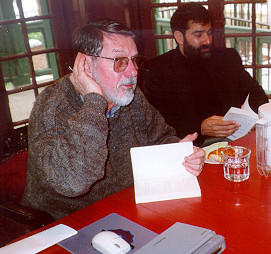Asking Creeley about Williams

Interview and discussion in April 2000:
FILREIS:
Now back to Williams, your initial response to Williams — according to something you said at Camden in December [1999] — was that what mattered to you in reading Williams, particularly The Wedge, was that the work was driven by anger. This is what, at least, Ron Silliman posted to the Buffalo poetics listserv afterwards. And then he went on to comment at how Williams had a huge impact on him as well, but it was a very different Williams. So, if anger is not quite operating as much, what’s your Williams now? How does Williams animate you now?
CREELEY:
Back to Ron’s point, that that wasn’t the Williams he read, he reads the later Williams.
FILREIS:
The Desert Music.
CREELEY:
Yeah. Which is not an unangry poem, so to speak. But it certainly isn’t nearly as angry as the poems he was writing in the thirties or twenties. Spring and All, for example. Or the “Descent of Winter,” or “March First.” Many of the early poems are really angry, and their emotional base is their revulsion and anger at the world he finds around him.
FILREIS:
So, now when you look back at Williams, how does it feel?
CREELEY:
Well, it feels very much like my own life. I, when young, felt a dismay, let’s put it, that such things as the Holocaust or the Second World War or the depression or many other factors in one’s real life, that these could be so unremarkable to the body politic, that it seemed not to matter.
Through the agency of my terrific wife, I sent an article, I think it was called “Bush Goes Green” from the New York Times to this listserv that a friend of ours sends us, you know, Barbie dolls and things women have to do to protect themselves in parking lots, lots of actually useful information, but the list has had a certain smugness. So, I zapped out this Bush article — Texas is fiftieth in education, and so on — and instantly comes back a letter: “Don’t send any more of this to me. I’ll vote for Bush no matter what.”
So, I was disappointed that one would vote for someone who commits to have his state have 25% of its population with no insurance, who would willfully do so, and fight to preserve that situation. I still feel anger in that way.
But again, back to the verse, think of the classic phrases humans make: X wants to make his peace with the world. The resistances of Lawrence’s, the day of my interference is done, the recoil outstrips the advance, et cetera.
I remember one time, terrifically, I had the chance to ask Kenneth Burke at a community meal we were all at up in Orono, there was a moment when I had him to myself, so to speak, and I asked him quickly: what advice would you have for someone as myself who is getting old. And he looked at me and said: Don’t boast. You won’t be able to back it up.
Therefore, it isn’t don’t get angry, don’t use anger as a primary emotion. It’s extraordinarily hard to sustain. It always was incidentally.